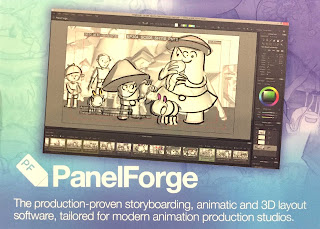Panel Forge Pro, extensively tested at Blue Zoo on Miffy the Rabbit and Digby Dragon, makes use of 3D Layouts to save time in Storyboarding, allowing board artists to use low resolution 3D assets to help set up camera angles and layouts. Good news then for storyboard artists, who can now learn to use this new software for free.
 Problem solving
Problem solvingPanel Forge is all about solving problems. And the biggest problem with storyboarding is you have to do too much all at once.
Board artists have to deal with drawing sets and layouts (drawing in perspective), designing camera angles accurately and - all at the same time - describing the action of the shot and also expressing the character's emotions and feelings. It's a lot to do, all at the same time.
Like Redboard, Panel Forge helps board artists to set up the shot and solve a number of these problems long before they start drawing. It makes the business of creating storyboard panels faster, and saves time in 3D Layout.
Solving Layout problems up front
Storyboard artists use the 3D layout tools to set up their shots right from the start - thus saving time in storyboarding - because the 3D layout problems have been solved in the beginning.
Studios can save time and money because they don’t need a separate layout department, since the storyboard artists have already done this job with Panel Forge Pro. In effect, storyboarding and 3D layout are now one department.
According to Blue Zoo's Tom Box, the software is designed to use “big data sets” and be super fast and also easy to learn. The software uses .obj files and .pfe files – the last a proprietary Panel Forge file type.
3D Software
Catherine, one of Blue Zoo’s storyboard artists did a demonstration of Panel Forge, starting off in the "canvas view". Artists start off by making asset libraries of characters, sets and props. You can import low resolutions models, and you can dolly move and zoom around the objects – just like in Maya. You can also move pivot points and move objects around – just like in Maya (or indeed any 3D software). The camera also has a full range of tools so you can position it easily, dollying, moving and zooming. Camera focal length is also fully adjustable. For storyboarding, you can draw over the 3D models, and strengthen the pose – or make the pose completely different.
Integration with Maya
Panel Forge can also be integrated with the Maya pipeline. You can import models from Maya to Panel Forge, and also export a xml file which can be imported into Adobe Premiere. Once you like the animatic you’ve done, the animators can import the xml file into Maya, and then start work on their shots.
Jellyfish pictures in London are also using it - the team wanted to test out the pipeline at another studio, and make sure it works across multiple platforms.
Time and Money
The logic of using Panel Forge is that it "saves a heck of a lot of time and money" on production - allowing the studio to concentrate resources elsewhere, such as in character animation, lighting and rendering.
Free Demo Version
Panel Forge is now available - for free! - for students to practice their skills (on a non-commercial license, of course). To download your free copy, go to the official site at www.panel-forge.com. You can also email them at Enquiries: contact@panel-forge.com.
Demonstration
To see how Panel Forge works, watch the video below:
Introducing Panel Forge from PanelForge on Vimeo.


No comments:
Post a Comment